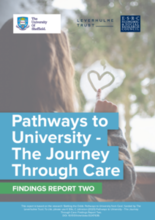Displaying 191 - 200 of 949
With young people at the centre, this inquiry examines the needs and aspirations of young people leaving care and the capacity of the service system to respond to those needs and aspirations. The report makes 15 recommendation to enhance the service system’s capacity to improve the experiences and life outcomes for young people transitioning from care by responding to their needs, challenges and aspirations.
This cross-national study compares and contrasts how two states- one in the U.S. (Illinois) and one in Spain (Catalonia)—support care leavers as they transition into adulthood.
This report looks at what is known about outcomes for young people in care transitioning into adulthood in British Columbia, with particular focus on the over-involvement of the child welfare system in the lives of First Nations, Métis, Inuit and Urban Indigenous children and youth in care. The report calls on government to enact comprehensive and lasting change for the young people in its care as they transition into adulthood.
This paper is a narrative review examining the high prevalence of care leaver early parenting in the context of (i) key transitions from care studies taken from the last few decades, (ii) a structured review using Scopus of studies from 2015–2020 focussed specifically on young people transitioning from care and early parenting and (iii) Boss’s (2010) Ambiguous Loss theory.
This webinar heard from three of Family for Every Child's member organisations about their programmes to both integrate and reintegrate children on the move.
The authors of this study conducted research with 234 care experienced university students in England and Wales to explore their experiences of the journey through care.
The International Care Leavers Convention brought together Care Leavers at an international level to amplify the voices of children and young people and provide them with a platform to learn, share and exchange experiences, knowledge and challenges. This document highlights some key takeaways from the event.
This study used the 2000–2017 waves of the Adoption and Foster Care Analysis and Reporting Systems. The authors identified foster care entries among children removed from their homes because of parental drug use (PDU) and calculated the number of entries for each year. They also identified foster care discharges achieved through parental reunification among children removed from their homes each year.
This article presents empirical results from a study (2015–2018) on young people leaving care in Luxembourg. A special focus deals with the processes of transitioning from care to work.
Drawing on a review of recent international literature, this article argues for the first time that an understanding of, and engagement with, the theory and practice of friendship is essential to working alongside those who have care experience.




